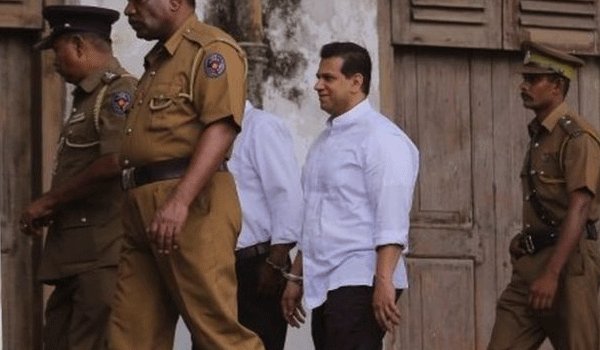There are many contradictory theories and opinions within the legal circles regarding the divided verdict issued at the end of the trial.
While indictments were filed against 13 defendants, Judge Padmini N. Ranawaka ordered the death sentence for five defendants including Duminda Silva for charges of Manslaughter and imprisonment for murder charges.
Judge M.C.B.S. Morayes did not give his verdict but was in agreement with Judge Padmini N. Ranawaka’s verdict.
Disparities in evidence:
Judge Shiran Gunaratne who was the chairman of the three judge bench issued a separate verdict releasing the defendants from all charges.
His opinion was that the case could not be proved beyond reasonable doubt and his verdict was based on the fact that there was disparity in the statements of the witnesses
Accordingly, he said as such the benefit of the doubt should have gone to the defendants.
Ignoring initial statements:
In Judge Padmini Ranawaka’s verdict too the disparity in the evidence was indicated.
However she had chosen to disregard the statements the witnesses had made to the police and accept only the statement made in court when issuing the verdict.
Although it was stated that the witnesses had faced death threats and pressure at the time they made the statements to police, none of the witnesses had mentioned anything about such threats in court.
As such, ignoring the initial statements is baseless and puzzling.
Generally, evidence given by a witness immediately after an incident takes place is considered more accurate than evidence given after a period of time.
Evidence given after a period of time after the incident can be influenced and it is normal that both statements made to police soon after the incident had changed later when the evidence was heard in court.
It is an acceptable fact that in such instances, the court has to be very mindful when considering evidence given by witnesses who change their statements later in court.
Disparative legal interpretations
However in reference to both verdicts, it was highlighted that two judges issued two contrasting judgements regarding a single incident.
The evidence given by petitioner’s witnesses to police initially were changed when they gave evidence in court or in certain instances the evidence was proved false.
Extremely poor police investigations
Further all the witnesses were those of the plaintiff’s party.
The police investigations had also failed to obtain evidence from independent parties, even when required.
During the trial it was revealed that the police had conducted the investigations in a very weak manner.
In some instances, the evidence given by certain police officers were beyond any credibility and riddled with flaws.
The investigations were headed by two officers responsible for investigating serious financial fraud and malpractices of the previous regime. As such it is highly puzzling that there were so many flaws in the investigations conducted under these esteemed officers.
First shot fired by the prosecution party
However, in issuing the verdict in this case, it is legally challenging to have determine that the defendants had committed these crimes on a collective intention.
There is no evidence to indicate that this crime was committed according to a pre-determined plan and issue the verdict on the presumption that all the defendants had committed this crime based on their previous indifferences.
The crime was committed by a single person using a single weapon, without any order from anyone else.
The entire incident was sparked by instant rage and moreover, the first shot was fired by the complainant’s party.
There are many legal disparities in the two verdicts that were issued in this regard while this trial had created a huge uproar in the legal circles. Hence we intend to analyze this case further in the coming weeks.
(Sathhanda –Subash Jayawardena)






